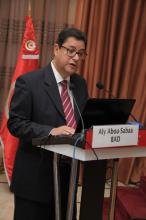“The time is ripe for African countries to benefit from new technologies”, M. Abou-Sabaa, Vice-President AfDB

Eminent speakers from the private sector, government, education and the development sector agreed on the crucial impact of information and communication technology (ICT) on the future of education and training in Africa on the official opening day of a ministerial forum on 10 December 2013 in Tunis.
The forum is co-organized by the Association for the Development of Education in Africa (ADEA), the African Development Bank (AfDB), the United Nations Educational, Scientific and Cultural Organization (UNESCO), the Organisation internationale de la francophonie (OIF) and Intel, under the auspices of the Tunisian government through its ministry of education.
In his opening remarks, Aly Abou-Sabaa stressed the importance placed by the Bank on the role of ICT in education. He said the AfDB would “continue to support innovative teaching based on ICT. By this, I mean e-learning.”
He noted the challenge faced by educators in Africa, alluding to a UNESCO study reporting that 30 million African children were not attending school. “Clearly the quality of education must be enhanced”, said Mr. Abou-Sabaa. “The time is ripe for African countries to benefit from new technologies.”
ICT can help a lot, he added, saying it could help Africans “become full participants in the modern technology of today.”
Mr. Abou-Sabaa quoted Nelson Mandela, on the day of the former South African president’s memorial service: “Education is the most powerful weapon you can use to change the world.”
Mr. Dzingai Mutumbuka, chairman of ADEA, said there needs to be “a new approach in which ICT is fully integrated into education and training.”
He added: “Don’t hesitate to take advantage of this wonderful platform to, as they say, think outside of the box….to provide Africa with a modern education system to become the continent of the future.”
The Honourable Mongi Marzouk, Tunisia’s minister of information and communication technology, said his government would be noting the recommendations from the forum.
The minister added that ICT was a source of wealth and the development of capacity and knowledge. He referred to his country’s history in ICT and education, recalling that Tunisia established a “virtual school” in 2002 and a “virtual university” in 2003.
In her ministerial remarks, the Honourable Marie Jacqueline Nana Togola, Mali’s minister of national education, said: “We should turn to ICT and use it as best we can to improve education in our country.”
She went on: “ICT at the service of education will enable us to improve access to schools and education and will help us&
